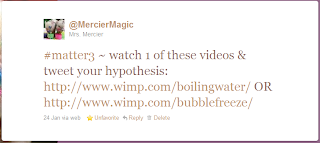Equitable Access
A common comment educators make is,"Only my high kids can do that." Having been a kid that's been all over the achievement spectrum and having close friends and family who have been considered low, I take issue with this statement. Particularly when it comes to technology. Struggling learners are still being denied access to valuable tools because of their academic achievement, learning disability, or IQ.
While technology is not a natural fit for everyone and it is not a one-size fits all tool, it is accessible to all. I have most likely stated this in many places before, but feel it needs to be restated. Technology has the unique capability of reaching all modalities. It allows everyone to learn at their own pace. It provides authenticity. And let's face it, its all literacy.
I have seen students unable to decode and encode sight words quickly learn how to do so using technology. E-books read to them and highlight the words being read. Social media (yes) encourages correct spelling. Over time repetitive spelling of words on Twitter and Facebook make it automatic and transfers to paper. The same is true for grammar. I have seen children who do not respond to years of daily drill of sight words progress with technology.
The child who everyone said was incapable of learning or doing anything becomes a superstar. Those of us who frequent Web 2.0 tools know that there is some similarity in the use of them. The repetition of the sites allows their confidence to build. A child who can not explain how to multiply can teach someone else how to navigate their way through Twitter. Teaching them how to upload pictures, follow, and block/report users.
The child who struggles with fine motor skills can navigate their learning on line. They can type with ease, without worry of how their letters are formed or words are spaced. It is easier for them to space their words. Or they can record themselves with a microphone or webcam. Suddenly, a child who had little to say on paper is suddenly a fluent writer.
Ease of use is a huge thing for struggling learners. While some Web 2.0 tools are more difficult to use than others there are some, like Vocaroo and Wordle, that are easier. Then there is the Flip. Just point and shoot (after turning it on). You can even create the movie right on the camera with a click of a button. Children as young as three find great success with this tool!
Every child needs the opportunity to use technology. The child everyone says is bright but bored. The child who struggles to speak. The child with poor motor control. The child with poor language skills. They all need it. To deny them the use is cruel.

I think that is great that you go to at least one school a year to see how the teachers are with the students. I'm from a small town in Nebraska and our schools are way different than a lot of them in Connecticut. I also agree that music can teach a lot. I can't remember many things, but i can remember songs word for word. When I walk into my school, I know it will be a good day. The students won't do anything if the teacher dont have communication with the students. I know it's not always the teachers fault; there are students that just don't care.
ReplyDelete